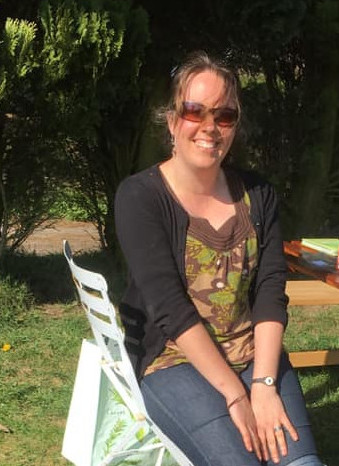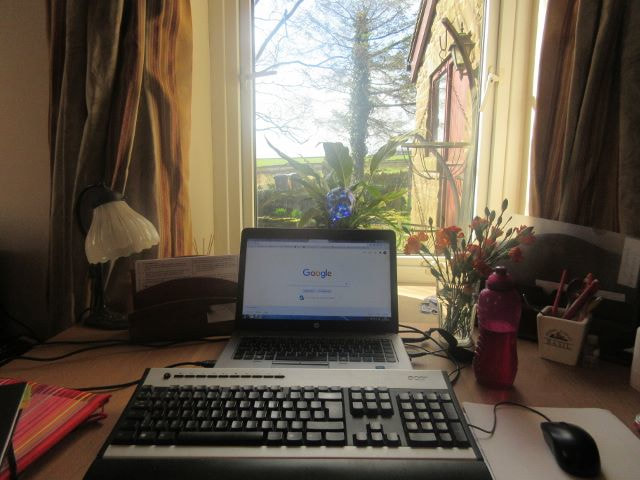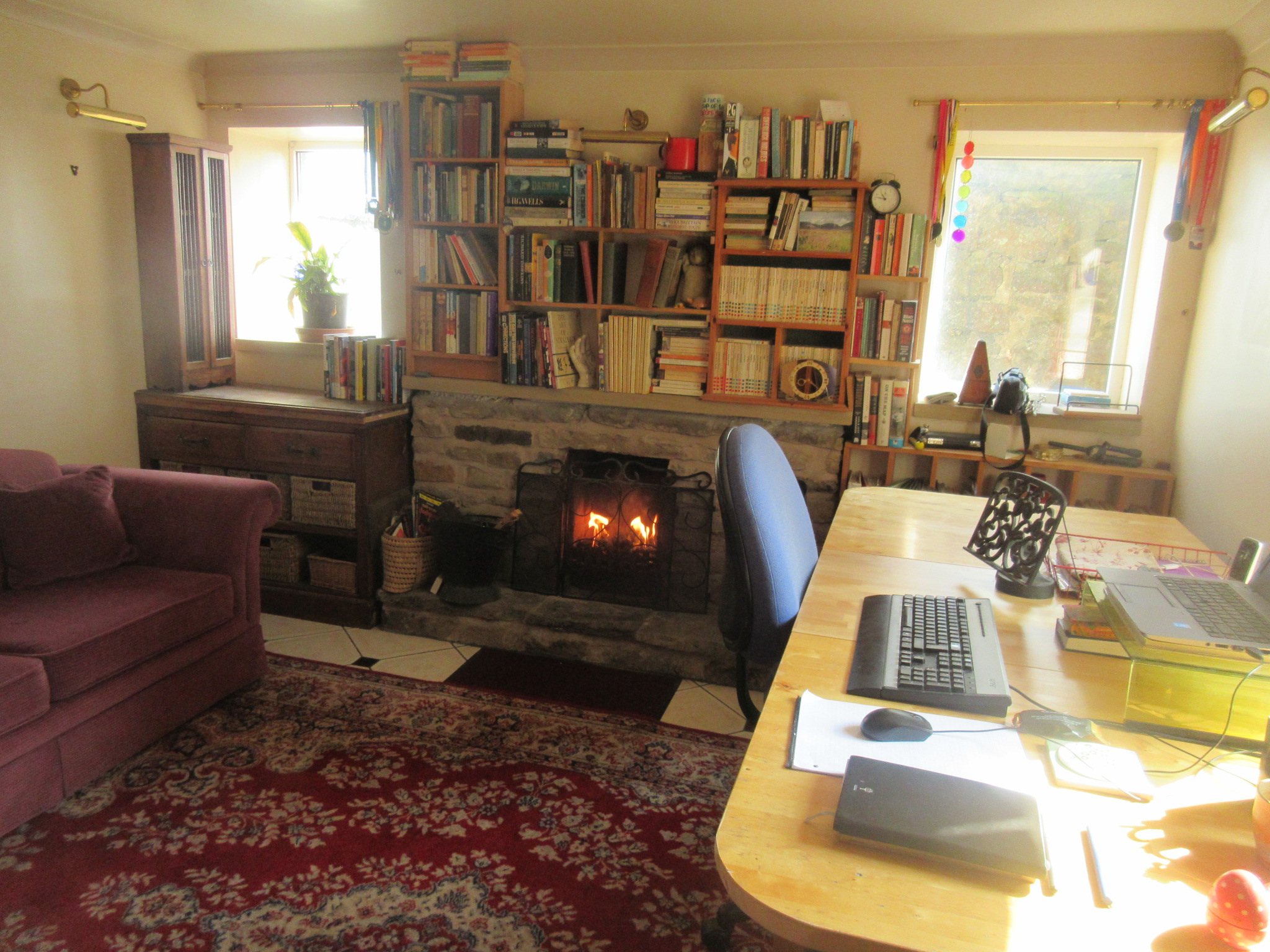by Jenni Brooks
 This blog post was originally written in August 2017, Jenni has provided an update below.
This blog post was originally written in August 2017, Jenni has provided an update below.
There’s a lot of talk about ‘right livelihood’ in permaculture circles. I’ve always been unsure about the term – if there’s a ‘right’ livelihood, that means there’s a ‘wrong’ one too, and who decides which is which? When I’ve heard it used in relation to permaculture, it’s often been associated with making a living from growing food or teaching permaculture. I felt the term didn’t apply to me as I didn’t want to earn money from either of those things.
The concept of right livelihood wasn’t invented by permaculture practitioners – it’s a key part of Buddhist teachings, and has been described as practising a "profession that harms neither humans nor nature, physically or morally".
Buddhists have asked, "How can work become meaningful? How can it be a support not a hindrance to spiritual practice – a place to deepen our awareness and kindness?".
Thinking of the ‘right livelihood’ concept in this broader sense has encouraged me to think about how I can use permaculture design to make my working life more effective for myself and the wider community.
My work history
 I am an academic. I arrived here by a fairly traditional route – good degree, masters degree, PhD, and six years of fixed term contracts in a research unit before landing my first permanent job at the start of 2016. In between, there were a couple of years of voluntary posts supported by part time work.
I am an academic. I arrived here by a fairly traditional route – good degree, masters degree, PhD, and six years of fixed term contracts in a research unit before landing my first permanent job at the start of 2016. In between, there were a couple of years of voluntary posts supported by part time work.
Over the years, I’ve worked in a newsagents, a bar, a youth hostel, a care home. I’ve handed out leaflets for a hairdresser, transcribed interviews for other researchers, made notes in lectures for deaf students, and been a personal assistant. It’s been a varied career.
These days, I spend my time on a happy combination of research and teaching. I teach basic sociological theory to first year undergraduates, along with research methods and study skills. I also teach about health inequalities, and about people’s experiences of disability and illness. All of this comes with a fair amount of pastoral support and encouragement.
My research work is largely focused around social care, disability and dementia. I am a qualitative research, so I spend a lot of time talking to people, and I strive to be as ethical as possible in all that I do.
But my job involves nothing ‘environmental’, nothing to do with nature. I spend most of my days in a classroom, or in front of a computer screen, locked away in an office, or else trekking up and down the country on a train. I’ve never mentioned permaculture at work.
Do I have a right livelihood?
Thinking about permaculture at work
I started thinking about permaculture in relation to work after a tutorial with Katie Shepherd at the national diploma gathering in February 2017. I was considering a wider design around ‘living in the here and now’ while we got our house ready to sell. I thought about how I spent my time, and as I work full time and my job can be quite intense, a lot of my time is spent at work.
I began by thinking about my vision.
- I want to be positive and cheerful
- To identify wit the label ‘sociologist’ (I still feel like an outsider)
- To contribute to the academic community in my own department and beyond
- To be a supportive and creative teacher
- To do useful and interesting research
- To be a collaborative colleague and generous with my ideas and enthusiasm (but protective of my time)
- To write for different audiences
Then I thought about my existing work in relation to the permaculture ethics.
Earth care
Travel
Occasionally my work involves a bit of travelling to visit research participants, or present at conferences. I’ve always done this by train. I’ve flown once in my seven years of academic work – to spend a week working in a department in Norway.
Currently I live just over a mile from work, so I either walk or cycle. My previous job was in a different city, so I travelled by a combination of bike and train – it worked well, but took two hours each way.
However, we are in the process of moving house, and if all goes to plan, we will be 27 miles away, with no public transport. A car commute is a new thing for me, and one that I’m not wholly comfortable with. We’ll be making the best of it by buying a small, efficient car, travelling together to combine journeys, and I’ll be working at home whenever I can (which is quite a bit).
Materials
I do a lot of photocopying. Some of this is unnecessary. My computer system automatically tracks the cost of what I’ve printed each year, and this will reset on 1st September – I’m aiming to cut at least a third off what I’ve used this year.
Greening the curriculum
I’ve most often heard this phrase applied to school age education, but there’s no reason why it shouldn’t apply to universities too. I don’t have control over the content of everything I teach, but I do have a large degree of control over some of the examples and texts that I use, and for some courses I can make larger decisions about content.
I’ve already changed the focus of one assessment so students are asked to research and write about an environmental issue of their choice. This year I’m planning to introduce discussions about climate change into classes about health inequalities. One day I’d like to introduce a new optional module about ‘nature and society’ – similar to the one I took as an undergraduate many years ago.
People care
Me
Care of myself is often the first thing to do when work gets busy. I forget to take lunch to work, so snack on unhealthy ‘treats’ from the café. I arrive early and work late. I worry about things that probably aren’t mine to worry about. I say ‘yes’ when I should probably say ‘no’. I don’t always take a day off when I should. By the end of each term, I end up tired and in a heap. Not good.
My students
I have a pastoral role for some students, as well as a teaching one. I strive to make lessons interesting and encourage creativity in assessments, but I am aware that I’m still a relatively inexperienced teacher and I don’t always get things right. This year I want to build on the postgraduate teaching course I did last year and facilitate my students to pursue their own interests and become a little more self-reliant in meeting their own studying needs.
Colleagues
I couldn’t ask for a better set of colleagues. I have benefitted enormously from their expertise in my first months in this new job, and am grateful to them for sharing lesson plans, materials and tips. I strive to be as generous with my own teaching materials as they have been, and to encourage and praise the people around me to contribute to a positive working environment.
Wider community
I encounter a lot of people who have kindly agreed to take part in my research. I aim to behave as ethically towards them as possible, and, where possible, to involve them in decisions about how the research is shaped. I always endeavour to make sure that my research is useful to wider society in some way.
I would like to contribute to the wider academic community more this year, perhaps by getting involved in the running of a professional association or putting more attention into my academic blog writing.
Fair shares
What I teach
I teach sociology, and many of my courses are concerned with inequality. Sadly, there is even more scope these days to update my course materials with recent examples of structural inequality.
A lot of the traditional sociology curriculum is based around the teachings of ‘dead white men’, and as a department we have an aim to include wider perspectives and the work of more marginalised scholars in our teaching materials. I will work with colleagues to do this.
Supporting those around me
I continue to be blessed with strong mentors and more experienced colleagues who can pass their wisdom on to me. I will endeavour to do the same for others whenever I can.
Looking at work in this structured and systematic way has got me thinking about what I could do now and what I can change. This post is already long and unwieldy, so I’ll stop here for now, but there are a few things I want to address in the future:
- Areas of responsibility
- Energy inputs and outputs
- Automating processes that I do regularly
- Identifying patterns
- Many elements to meet one function, many yields from one element
- Supporting documents (daily, weekly, monthly routines, time logs)
Update April 2019
 I really enjoyed thinking about my ‘ordinary’ job in permaculture terms – so much so that I did a whole design around this for my diploma in applied permaculture design.
I really enjoyed thinking about my ‘ordinary’ job in permaculture terms – so much so that I did a whole design around this for my diploma in applied permaculture design.
My new ‘environment and society’ module starts in 2020. My preparations for that will help me to adapt my other teaching too. I’m getting better at saying ‘yes’ to the right things, and I’ve taken on new roles that contribute to the wider academic community.
We did finally move house and I now have a one hour car commute. Not ideal, but as predicted I do work at home a lot, and we plan our activities to travel together and minimise car use as much as possible.
I’d encourage you to apply permaculture principles and tools to your working life, even if you don’t have what you might think of as a ‘permaculture’ job. A right livelihood comes in many forms. And anyway, I’ve found the process of thinking systematically about energy leaks, use of resources, beneficial relationships, and yields has made me more efficient and effective at work – which of course leaves more time for gardening!